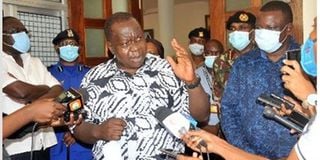Uhuru extends curfew to March 12

Interior CS Fred Matiang’i addresses journalists at the Kenya School of Government in Matuga, Kwale, on December 7, 2020 after holding a security meeting with the county leadership.
What you need to know:
Mr Kenyatta has also banned political gatherings for 60 more days.
Organisers of burials and weddings should seek prior approval and have a maximum of 150 people attending.
President Uhuru Kenyatta has extended the night curfew to March 12, Interior CS Dr Fred Matiang’i has said during the schools’ reopening press briefing.
The nationwide curfew will continue to be enforced between 10pm and 4am daily, the president said in an Executive Order signed on Sunday morning.
The Order also extends other Covid-19 containment measures, the CS said.
At the same time, Education CS Prof George Magoha said the government will provide three million needy learners with masks as schools reopen Monday.
He requested parents who can afford to buy at least two facemasks for their children.
Done everything possible
“I want to affirm very strongly that the government has done everything possible to ensure schools will open tomorrow,” he said.
The CS, however, confessed that it will not be possible to achieve the required one-metre social distancing in classrooms.
He reiterated that schools should create space under trees, dining halls and any open space.
The CS, at the same time, told parents should not take advantage of the government’s guideline of school fees –that no learner should be sent home due to lack of school fees- and emphasised that parents will have to pay fees for schools to maintain their children.
Only needy learners will be exempted from fees payment, he said.
Prof Magoha also said the government has released Sh4 billion for free public primary schooling, which should get into their accounts on Monday or Tuesday.
He said secondary schools will get their Sh14.6 billion by Friday.
For his part, Transport CS Mr James Macharia announced the doubling of the inter-county trains on Monday to ease travel for learners.
In the Executive Order, the president banned schools co-curricular activities like sports, drama, music and prize-giving for 90 days as well as all exchange visits between schools.
Banned political gatherings
Mr Kenyatta has also banned political gatherings for 60 more days and ordered that organisers of burials and weddings should seek prior approval and have a maximum of 150 people attending.
He has also prohibited all-night vigils popularly known as keshas and directed that all other religious gatherings should adhere to the existing Inter Faith Council guidelines.
He has also ordered that teachers and other Staff who are aged 58 years or above, or who have pre-existing conditions, should "deliver on their duties through remote means or by holding their lessons in open spaces with natural flow of air".
In addition, he said, all non-essential visits to schools by parents and guardians are prohibited and should only be allowed in exceptional circumstances – “in fidelity with the guidelines issued by the Ministry of Education; with all visitors to schools being registered in the school records and being subject to all infection prevention protocols.”
The president added: “All schools shall ensure that they have adequate hand-washing stations corresponding to their student population, in line with the guidelines issued by the Ministry of Health and the Ministry of Education.”
He went on: “Schools experiencing water problems must ensure that there is adequate availability of hand sanitisers for both the students and the teachers.”
The head of state added that teachers and students must wear appropriate facemasks when on the school premises or within school transport, in addition to strictly applying hand-hygiene and physical spacing.
He directed school principals to maintain a register of all sick learners or teachers, and immediately inform the County Health Department of all instances of moderate to severe illness.
“The County Health Departments are directed to carry out routine surveillance for COVID-19 and other public health problems in all schools; including random sampling of pupils, teachers, and ancillary staff,” said the president.





